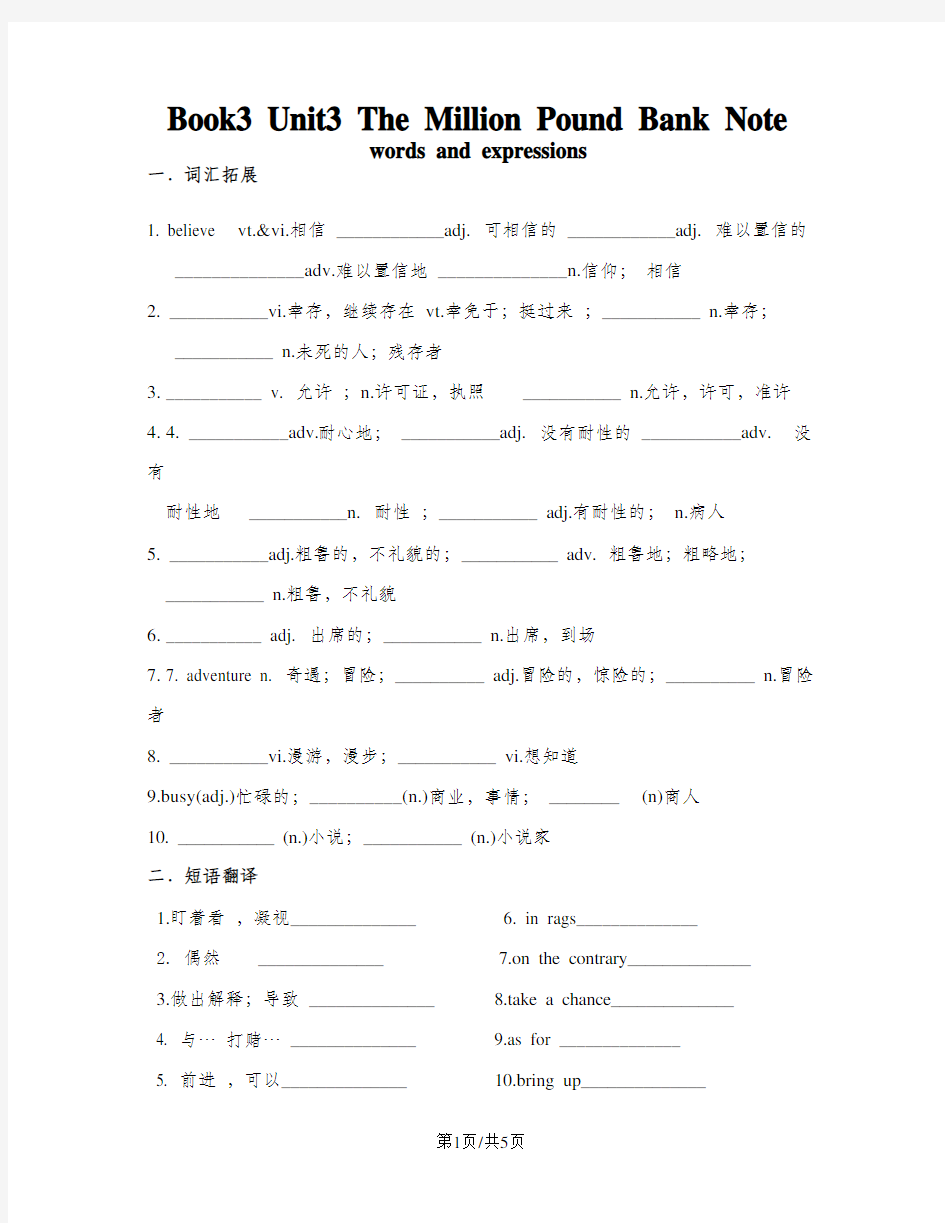

Book3 Unit3 The Million Pound Bank Note
words and expressions
一.词汇拓展
1. believe vt.&vi.相信____________adj. 可相信的____________adj. 难以置信的
______________adv.难以置信地______________n.信仰;相信
2. ___________vi.幸存,继续存在vt.幸免于;挺过来;___________ n.幸存;
___________ n.未死的人;残存者
3.___________ v. 允许;n.许可证,执照___________ n.允许,许可,准许
4.4. ___________adv.耐心地;___________adj. 没有耐性的___________adv. 没有
耐性地___________n. 耐性;___________ adj.有耐性的;n.病人
5. ___________adj.粗鲁的,不礼貌的;___________ adv. 粗鲁地;粗略地;
___________ n.粗鲁,不礼貌
6.___________ adj. 出席的;___________ n.出席,到场
7.7. adventure n. 奇遇;冒险;__________ adj.冒险的,惊险的;__________ n.冒险者
8. ___________vi.漫游,漫步;___________ vi.想知道
9.busy(adj.)忙碌的;__________(n.)商业,事情;________ (n)商人
10. ___________ (n.)小说;___________ (n.)小说家
二.短语翻译
1.盯着看,凝视______________ 6. in rags______________
2.偶然______________ 7.on the contrary______________
3.做出解释;导致______________ 8.take a chance______________
4. 与…打赌…______________ 9.as for ______________
5. 前进,可以______________ 10.bring up______________
三..根据中文意思或用所给单词的适当形式填空。
1. The principal’ s ________ (出席) at the party didn't t seem to be very welcome.
2. Finally he lost his ________ (耐心) and started to yell at his mother.
3. He was punished for his _______ (粗鲁) to his teacher.
4. They entered the area without ________ (允许).
5. My husband loves ________ (adventure)life while I enjoy a more peaceful life.
6. ①. It is __________ that he has passed the last final examination .
②. I hold the strong ___________ that I can achieve my dream in the future.
③. ___________,nobody can solve this simple problem. (believe)
7. I enjoy reading __________,especially the works of Mark Twain,who was a
worldwide ____________. (novel)
8. ①. The parents lost _________ with his naughty son and even wanted to give him up.
②. Generally speaking,most teachers are_______ with students and kind to them.
③. As a nursery teacher ,you mustn’t be ___________ with the children .
(patient)
四.选词填空
couldn’t wait to leave the theatre.
2. Tell me what you ____________ yourselves last Sunday.
3. Don’t look at me in such way;I don’t like being ____________.
4. The program made in yesterday’s conference will soon _____________.
5. You shouldn’t consider Tom poor though he is ____________.
五.语法填空
The woman often called the First Lady of New York died in August. Brooke Astor was one hundred and five years old. The extremely wealthy and famous New Yorker spent much of her life1. (help)the needy in her beloved city. She was born in Portsmouth,New Hampshire. She was the only child of a high level military officer. After two earlier2. (marry),she married Vincent Astor in 1953 again. He came from a family3. had been rich for at least one hundred years. Among other things,he owned many buildings in New York City. Brooke Astor became one of the 4. (rich)women in the world when Vincent Astor died. She also became head of a huge charity organization 5. (found)by her husband. He reportedly had told her she would have fun 6. (give)away his money. And apparently she did. Missus Astor gave tens of millions of dollars7. (main)to places and people in New York City. She said it was the sensible choice 8. that was where the money had been made. She gave financial support to the city’s cultural centers,its poor and disabled as9. as to many other smaller charities. When she died,the mayor of New York said the city would not be what it is today 10. her support.
Unit3 The Million Pound Bank Note
words and expressions答案
一.词汇拓展
观察内容的选择,我本着先静后动,由近及远的原则,有目的、有计划的先安排与幼儿生活接近的,能理解的观察内容。随机观察也是不可少的,是相当有趣的,如蜻蜓、蚯蚓、毛毛虫等,孩子一边观察,一边提问,兴趣很浓。我提供的观察对象,注意形象逼真,色彩鲜明,大小适中,引导幼儿多角度多层面地进行观察,保证每个幼儿看得到,看得清。看得清才能说得正确。在观察过程中指导。我注意帮助幼儿学习正确的
观察方法,即按顺序观察和抓住事物的不同特征重点观察,观察与说话相结合,在观察中积累词汇,理解词汇,如一次我抓住时机,引导幼儿观察雷雨,雷雨前天空急剧变化,乌云密布,我问幼儿乌云是什么样子的,有的孩子说:乌云像大海的波浪。有的孩子说“乌云跑得飞快。”我加以肯定说“这是乌云滚滚。”当幼儿看到闪电时,我告诉他“这叫电光闪闪。”接着幼儿听到雷声惊叫起来,我抓住时机说:“这就是雷声隆隆。”一会儿下起了大雨,我问:“雨下得怎样?”幼儿说大极了,我就舀一盆水往下一倒,作比较观察,让幼儿掌握“倾盆大雨”这个词。雨后,我又带幼儿观察晴朗的天空,朗诵自编的一首儿歌:“蓝天高,白云飘,鸟儿飞,树儿摇,太阳公公咪咪笑。”这样抓住特征见景生情,幼儿不仅印象深刻,对雷雨前后气象变化的词语学得快,记得牢,而且会应用。我还在观察的基础上,引导幼儿联想,让他们与以往学的词语、生活经验联系起来,在发展想象力中发展语言。如啄木鸟的嘴是长长的,尖尖的,硬硬的,像医生用的手术刀―样,给大树开刀治病。通过联想,幼儿能够生动形象地描述观察对象。1. believable;unbelievable;unbelievably;belief
2. survive ;survival,survivor
3. permit ;permission.
4. patiently;impatient;impatiently;patience ;patient
5. rude ;rudely ;rudeness
6. present ;presence
7. adventure ;adventurous ;adventurer
8.wander;wonder
9.business;businessman
10 novel ,novelist
二、短语翻译:
1.stare at 6.衣衫褴褛
2.by accident/by chance 7.正相反
3.account for 8.冒险
4.make a bet with sb. on sth. 9.关于,至于
5.go ahead 10.抚养,培养
三、1. presence 2. patience 3. adventurous
4. rudeness
5. permission
6. ①believed ;②belief ③Unbelievably;
7. novels;novelist
课本、报刊杂志中的成语、名言警句等俯首皆是,但学生写作文运用到文章中的甚少,即使运用也很难做到恰如其分。为什么?还是没有彻底“记死”的缘故。要解决这个问题,方法很简单,每天花3-5分钟左右的时间记一条成语、一则名言警句即可。可以写在后黑板的“积累专栏”上每日一换,可以在每天课前的3分钟让学生轮流讲解,也可让学生个人搜集,每天往笔记本上抄写,教师定期检查等等。这样,一年就可记300多条成语、300多则名言警句,日积月累,终究会成为一笔不小的财富。这些成语典故“贮藏”在学生脑中,自然会出口成章,写作时便会随心所欲地“提取”出来,使文章增色添辉。8. ①patience;②patient ③impatient
“教书先生”恐怕是市井百姓最为熟悉的一种称呼,从最初的门馆、私塾到晚清的学堂,“教书先生”那一行当怎么说也算是让国人景仰甚或敬畏的一种社会职业。只是更早的“先生”概念并非源于教书,最初出现的“先生”一词也并非有传授知识那般的含义。《孟子》中的“先生何为出此言也?”;《论语》中的“有酒食,先生馔”;《国策》中的“先生坐,何至于此?”等等,均指“先生”为父兄或有学问、有德行的长辈。其实《国策》中本身就有“先生长者,有德之称”的说法。可见“先生”之原意非真正的“教师”之意,倒是与当今“先生”的称呼更接近。看来,“先生”之本源含义在于礼貌和尊称,并非具学问者的专称。称“老师”为“先生”的记载,首见于《礼记?曲礼》,有“从于先生,不越礼而与人言”,其中之“先生”意为“年长、资深之传授知识者”,与教师、老师之意基本一致。四、1. on the contrary 2. do with
3. stared at
4. carry out
5. in rages
五、1. helping 2.marriages 3.that/which 4.richest
5.founded
6.giving 7.mainly 8.because
9.well 10.without